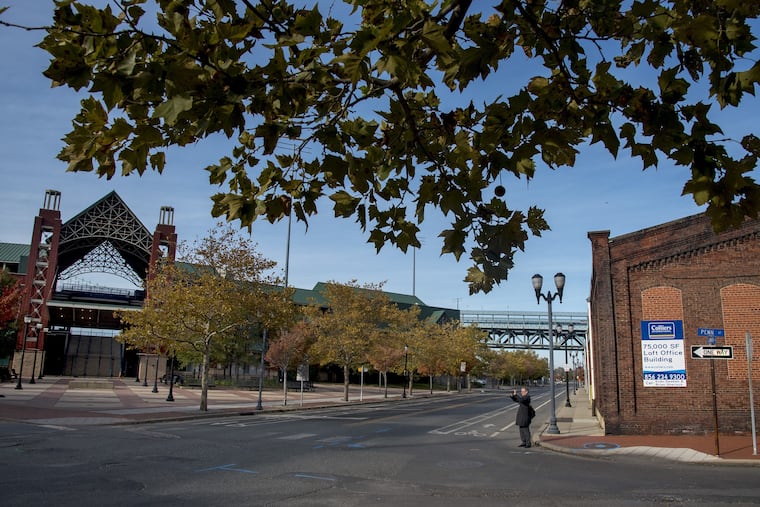Campbell’s Field demolition moves a step closer to reality
Campbell's Field is a step closer to being torn down after Camden County awards a contract Thursday to raze the stadium on the Camden waterfront.

Going, going, gone. Well, almost.
The Camden County Improvement Authority approved a $939,000 contract Thursday to demolish Campbell's Field, ending a once-promising era of professional baseball on the Camden waterfront. The vacant stadium, once home to the Camden Riversharks, will be torn down to make way for new athletic fields.
R.E. Pierson Construction of Pilesgrove, Salem County, is expected to begin clearing the eight-acre site in mid-December, said Freeholder Director Louis Cappelli Jr. Construction should be completed by spring 2020.
"There is no doubt in my mind that it will be sad to see the stadium go, but the redevelopment of those areas will create an amenity and asset open to all," Cappelli said in a statement.
Under a $15 million deal reached last year, the city and Rutgers-Camden agreed to purchase the 6,400-seat stadium from the county and raze it. Rutgers will manage the new athletic complex, which will include fields for baseball, hockey, soccer and lacrosse, and a track. The city and Rutgers are putting up $7.5 million each for the project.
The demolition marks a disappointing end to a big field of dreams for the prime site at the foot of the Benjamin Franklin Bridge that many hoped would draw baseball enthusiasts and developers to the waterfront. But the Riversharks, an independent minor league team, fell on hard times and ceased operations in Camden in 2015.
>>READ MORE: End is near for Camden's Field
The new complex will be used by the Rutgers-Camden NCAA Division III baseball team, which leased Campbell's Field for practices and games for the 2018 season. The team will play away games for the 2019 season and practice in a nearby field, said spokesperson Mike Sepanic.
County and city officials have said residents and neighborhood and youth groups, such as Little League, would also have access to the athletic fields. Community meetings will be held to get feedback from the neighborhood adjacent to the stadium, Cappelli said.
"We're excited to see what the future will bring," said Jonathan Latko, president of the Cooper Grant Neighborhood Association, which represents residents who live a few blocks from the stadium. "There's so much potential here."
The vicinity of the stadium is considered prime real estate, and many along the waterfront expressed concern about the vacant stadium. A proposal to erect a gigantic billboard in the area sparked fierce opposition from some residents who said it would mar the view of the Philadelphia skyline.
Mayor Frank Moran last week vetoed the billboard project. Vince Basara, the mayor's spokesman, did not respond to messages seeking comment Thursday on the demolition project and the new athletic plans.
"It is nice to see the demolition phase move forward," said Kris Kolluri, president and CEO of Cooper's Ferry Partnership, which is overseeing development in the city.
The state spent about $20 million to build the picturesque stadium. With about 3,100 people attending games on average and few winning seasons, the Riversharks struggled to stay afloat. The team ceased operations after it could not reach an agreement on lease terms with the county. Efforts to bring in a major league-affiliated baseball team also fell short.
The county purchased the stadium in 2015 for $3.5 million just ahead of foreclosure to maintain control of the land. The county collected about $100,000 annually from a lease with Rutgers and other events held there. The county owes about $3 million on a bond that will be retired by the end of the year under the agreement with the city and Rutgers, said county spokesperson Dan Keashen.
Ballpark Digest put Campbell's Field on its list of most endangered ballparks in the country, with odds it will survive of 1,000-1. The shuttered stadium stands out on the waterfront, surrounded by construction, including a $1 billion project underway nearby by Liberty Property Trust of Philadelphia.
"At its best, Campbell's Field brought some new life to a bad Camden neighborhood, but baseball there was not economically sustainable," Ballpark Digest said on its website.